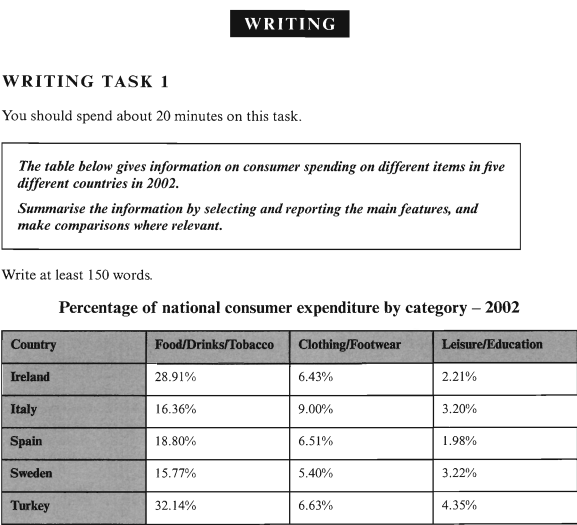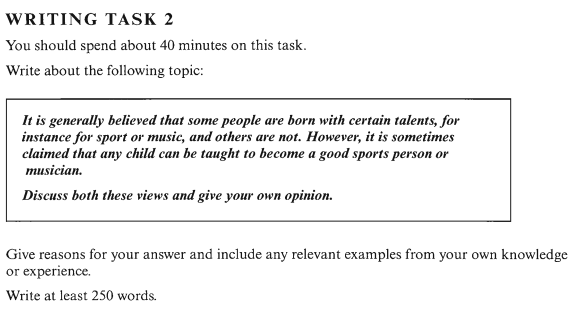剑桥雅思7写作:Test1雅思写作真题+范文
发布时间:2020-11-20 关键词:剑桥雅思7写作:Test1雅思写作真题+范文为帮助同学们学习,小编为大家整理了剑桥雅思7写作:Test1雅思写作真题+范文,希望能够对大家有帮助。关于剑桥雅思的资讯关注新航道北京学校剑桥雅思栏目。

剑桥雅思7写作范文Test1Task1:
范文
The table gives the breakdown about data on consumer spending on various items (Food/Drink/ Tobacco, Clothing/Footwear and Leisure/Education) in five different countries (Ireland, Italy, Spain, Sweden and Turkey) in 2002.
Generally, each country consumed much more in food/ drink/ tobacco where Turkey dominated the first place with 32.14%, standing in marked contrast with Sweden (only 15.77%) than in other 2 categories. In terms of Clothing/ Footwear, Italy expectedly spent most with 9% compared with still Sweden seeing the smallest proportion (5.4%). As for Leisure/ Education, it was Turkey and Spain that consumed the most and least with 4.35% and 1.98% respectively.
Additionally, we can see immediately that in food/ drink/ tobacco, after Turkey, Ireland, Spain and Italy came in turn with 28.91%, 18.80% and 16.36%. On the contrary, in Clothing/ Footwear, we failed to see big gap from Spain, Ireland and Sweden in middle positions which saw different reductions of 2.49%, 2.57% and 3.6% in comparison with Italy, likewise, in Leisure/ Education, still small differences were found. To be exact, Turkey was followed by Sweden, Italy and Ireland in a slow falling turn with 3.22%, 3.2% and 2.21%.
In conclusion, people prefer to spend on those products directly relating to food.

剑桥雅思7写作范文Test1Task2:
范文
The relative importance of natural talent and training is a frequent topic of discussion when people try to explain different levels of ability in, for example, sport, art or music.
Obviously, education systems are based on the belief that all children can effectively be taught to acquire different skills, including those associated with sport, art or music. So from our own school experience, we can find plenty of evidence to support the view that a child can acquire these skills with continued teaching and guided practice.
However, some people believe that innatetalent is what differentiates a person who has been trained to play a sport or an instrument, from those who become good players. In other words, there is more to the skill than a learned technique, and this extra talent cannot be taught, no matter how good the teacher or how frequently a child practices.
I personally think that some people do have talents that are probably inherited via their genes. Such talents can give individuals a facility for certain skills that allow them to excel, while more hard-working students never manage to reach a comparable level. But, as with all questions of nature versusnurture, they are not mutually exclusive. Good musicians or artists and exceptional sports stars have probably succeeded because of both good training and natural talent. Without the natural talent, continuous training would be neither attractive nor productive, and without the training, the child would not learn how to exploit and develop their talent.
In conclusion, I agree that any child can be taught particular skills, but to be really good in areas such as music, art or sport, then some natural talent is required.




